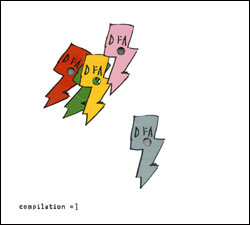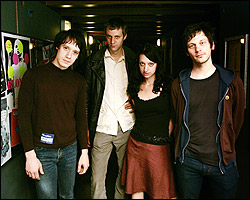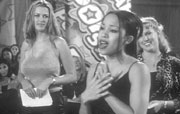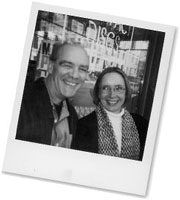In 2002, the New York City-based label DFA managed to pull the knife on the cutting edge while edging into some mainstream year-end polls at the very same time. The Rapture’s “House of Jealous Lovers” and LCD Soundsystem’s “Losing My Edge” found their way onto singles lists in Spin, Village Voice, NME, and The New York Times, and with good reason. The Rapture track all but defined the sound of the year with its sharp angles, tin-can disco beats, and crooked hooks, while LCD’s cut is an absolute anthem for those of us who refuse to become overly enamored of the latest Mars Volta release.
The LCD track starts like a 52-car pileup before sliding into a fairly lame preprogrammed backbeat. Soon enough, though, the stream of one-liners and direct disses is so funny it totally worksall eight minutes of it. “I was there/When Captain Beefheart started up his first band/I told him/Don’t do it that way/You’ll never make a dime,” intones James Murphy, LCD main man and DFA co-founder. Murphy doesn’t sing, he just sort of speakssometimes on doubled tracksbut with the track’s refrain, “But I was there!” balancing out the quasi-insecure “I’m losing my edge,” the track can be heard as a manifesto for the over-30 setor Arab Strap redoing V.U.’s White Light White Heat. That it comes from a man who puts out records by the blogging Brooklynites he calls out makes it all the more rich.
These two tracks appear on the hopefully titled DFA Records Presents Compilation #1 (DFA) alongside six other 12-inches. The Juan McLean contribute two tracks: “By the Time I Get to Venus” is an instrumental, atmospheric stoner swirl that would work as well in a dream sequence as it would on a dance floor, while “You Can’t Have It Both Ways” is far more iconic. “Nothing is safe,” go the disembodied, looped vocals over Giorgio Moroder-esque mess. You won’t see God in this track, but it’s stronger and saltier and has more staying powera good thing, since it’s over nine minutes long.
The Rapture toss in one more track; unlike the first, “Silent Morning” is not included on their new Echoes (see feature, left). A second LCD track, “Give It Up,” is the comp’s closest approximation of a real-world pop song. Meanwhile, the Black Dice contribute two touchy-feely sound collages. Didn’t they used to be a hardcore noise outfit? “Cone Toaster” is less Fremont-ish than the other Dice track, but it takes a good couple of minutes to break out of its wind chiming and into some dissonant clanking. “Endless Happiness,” however, does not eschew touching or feeling. It’s a wonderful if long-winded song, and with 15 minutes on its side, it manages to sonically exact its title. But fans of the Dice’s first album beware: Gone is the skronk and Melt Banana boogie, replaced by shimmer and Ennio Morricone-inspired compositions.








